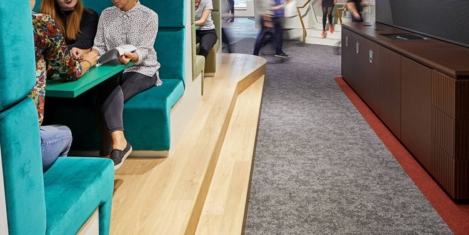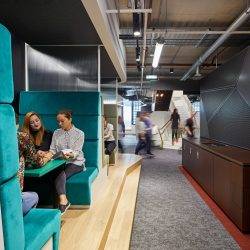To provide the best experiences, we use technologies like cookies to store and/or access device information. Consenting to these technologies will allow us to process data such as browsing behaviour or unique IDs on this site. Not consenting or withdrawing consent, may adversely affect certain features and functions.
The technical storage or access is strictly necessary for the legitimate purpose of enabling the use of a specific service explicitly requested by the subscriber or user, or for the sole purpose of carrying out the transmission of a communication over an electronic communications network.
The technical storage or access is necessary for the legitimate purpose of storing preferences that are not requested by the subscriber or user.
The technical storage or access that is used exclusively for statistical purposes.
The technical storage or access that is used exclusively for anonymous statistical purposes. Without a subpoena, voluntary compliance on the part of your Internet Service Provider, or additional records from a third party, information stored or retrieved for this purpose alone cannot usually be used to identify you.
The technical storage or access is required to create user profiles to send advertising, or to track the user on a website or across several websites for similar marketing purposes.
 Biomarkers for chronic stress are 40 percent higher in women bringing up two children while working full-time than for women with no children, new research suggest. Working from home and other forms of flexible working have no effect on their level of chronic stress – only putting in fewer hours at work helps, says an article in the journal Sociology.
Biomarkers for chronic stress are 40 percent higher in women bringing up two children while working full-time than for women with no children, new research suggest. Working from home and other forms of flexible working have no effect on their level of chronic stress – only putting in fewer hours at work helps, says an article in the journal Sociology.





















 New research has found that over 2 million UK workers think about quitting their job every day and this figure was significantly higher amongst younger workers, aged 18-24, with 12 percent of those surveyed stating they think about this daily. The research by CABA, a charity supporting the wellbeing of chartered accountants and their families, also highlighted that 38 percent of employees regularly encountered stressful situations at work. Women were most likely to feel this way, with 41 percent revealing they deal with stressful circumstances at least once a week. Comparatively, only 34 percent of male employees admitted to encountering such situations on at least a weekly basis. Many factors were cited as contributing to employees feeling stressed, including unrealistic expectations and unmanageable workloads. Regardless of how it manifests itself within the working environment it can have a negative impact on employee wellbeing, with over 1 in 10 (12 percent) missing at least 52 family events or personal commitments each year.
New research has found that over 2 million UK workers think about quitting their job every day and this figure was significantly higher amongst younger workers, aged 18-24, with 12 percent of those surveyed stating they think about this daily. The research by CABA, a charity supporting the wellbeing of chartered accountants and their families, also highlighted that 38 percent of employees regularly encountered stressful situations at work. Women were most likely to feel this way, with 41 percent revealing they deal with stressful circumstances at least once a week. Comparatively, only 34 percent of male employees admitted to encountering such situations on at least a weekly basis. Many factors were cited as contributing to employees feeling stressed, including unrealistic expectations and unmanageable workloads. Regardless of how it manifests itself within the working environment it can have a negative impact on employee wellbeing, with over 1 in 10 (12 percent) missing at least 52 family events or personal commitments each year.









January 25, 2019
The state of the workplace right now? Everywhere and nowhere, baby 0
by Paul Carder • Comment, Facilities management, Features, Premium Content, Property, Workplace design
(more…)